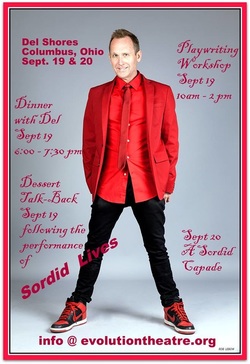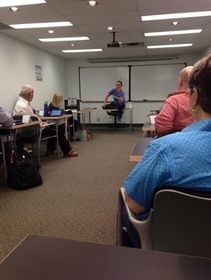 This past Saturday, I was fortunate to attend a play writing workshop led by Del Shores, the author of, among many other things, the hit play/movie/television series, “Sordid Lives.” The workshop was sponsored by Evolution Theatre Company (ETC). ETC is the Columbus-based LGBT theater company that has produced several of my plays. Del Shores is a fabulous raconteur, a seasoned writer, and a terrific instructor. The three writing exercises he led the class through made all of us think about characters, motivations, conflicts, and writing dialogue that sounds like it’s issuing from actual flesh and blood human beings. We started with each student briefly introducing himself or herself to the class. Then Del presented the first exercise: choose one of your fellow students and write a prose description of a character that is based upon: that person’s words; his or her appearance; how that person presented himself or herself to the class. But the person’s words, appearance, and presentation were simply the starting point. From there, we were to flesh out a character of our own creation. And we were to do this in just a few minutes. I wrote: “Alice is pretty, but she doesn’t believe it. She is neediness made flesh; a tall and lovely creature who is never still, is ever in motion: pacing, talking, hands flitting in the air as she despairs over her latest failed relationship, or the calamity that is her house, or the state of the world which should always, but never seems to, focus on or revolve around her.” Writing this way – fast and forced – was strange, difficult, and exciting.  The next exercise was to take that character and description and, in five minutes, write a monologue for him or her that involves some kind of conflict or issue. ALICE "What does she know about it? She can’t understand. There’s no way. Not her standing up there in her powder blue suit with her hand on her heart. Her! That hatchet-faced bitch! SHE knows what it’s like? Maybe she should try living with the idea day by day. How are you going to stay fed? How are you going to work? Where’s the money going to come from? And then you think and think and think. And there’s no real choice. No real option. So you make the appointment. And you get yourself there. And those people are screaming and pushing and blocking your way and calling you a killer. And you shove your way through. And you make the decision. And you follow through. And it’s done. Done. But not really. Not ever. But what does she know? Or understand. Nothing. Ever. It’s all too far from where she lives." More fast writing. More forced writing. Just as strange and difficult. And just as exciting.
WILLA Brand new. Bright and shiny. KARIN Real nice. Wish we could afford this. WILLA Gouged the wall coming down the stairs, of course. KARIN You can patch that so easy. WILLA Yeah. I can patch it. You know who’ll notice. Notice and say something. Mother. And Johnny. KARIN Oh, stop. Just focus on what’s good and new. Wish we had a new one. WILLA Talk to that husband of yours. When he comes home. KARIN What’s that supposed to mean? WILLA She’ll notice and she’ll say something. Mother. She always does. KARIN What do you mean – when my husband comes home? WILLA Right after that she’ll tell Johnny what a great thing he’s done. How he’s such a good provider. Giving me a new washing machine. Too bad that someone was careless and gouged the wall. Now he’ll have to fix that, too. KARIN Johnny is a good provider. You’ve got a new washer. You’ve got a new house. You’ve got that new blouse and skirt. What do you want? What’s it take to make you happy? WILLA He’s not going to patch that wall. He didn’t buy the washer. My money bought that thing. And I’ll be the one sitting on the steps with the spackle. KARIN What do you mean - WHEN my husband comes home? WILLA And how many days has it been? Creating characters and dialogue and conflict on the fly was demanding and nerve-wracking and exhilarating. It also gave me confidence and encouraged me, because I did it. I created characters. I gave them problems and desires and happiness and discontent. I created a setting. I placed my characters in that setting. I set them in motion and they began to interact.
I didn’t manage in the dialogue to address many of the issues and conflicts that I’d sketched out in the character descriptions, but this was a first wash, and just the start of the process. From here is where you really start to shape and form and build. The workshop was equal parts fun, fright, and delight. I learned a great deal. I’m so grateful that I had the opportunity to participate.
0 Comments
Leave a Reply. |
AuthorI'm a writer in Columbus, Ohio. I've written plays. short stories, and I am working on a novel. Categories
All
|
Proudly powered by Weebly

 RSS Feed
RSS Feed